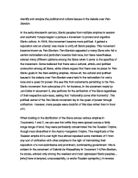Within the Church, many bishops held more than one diocese/bishopric. This meant that they earned large amounts of money from each diocese and was known as pluralism. Alongside absenteeism (obtaining income from a diocese, never visited by a bishop), pluralism made the Church appear to be more interested in monetary gain, than in the spiritual wellbeing of the French people, who were clearly very unhappy with such their bishops.
The gap between the 2nd and 3rd Estates probably caused the most discontent in French society. The nobles held nearly all the main stately positions such as ministers, “intendants” and high ranking military officers. Those who had bought offices (holders of “venal office”) were exempt from tax and illegally partook in industrial or commercial activities. The bourgeoisie felt that their power/wealth should be represented in the government, which caused a large amount of discontent, especially towards the end of the 1780s.
Economic Issues:
The system of taxation in France under the “ancien régime” was hugely unpopular. The Farmers-General was a private tax company which collected most of the indirect taxes. It was unpopular however, as people knew that most of the money was kept by the Farmers-General, and did not go to the Crown’s treasury. On top of this, the taille, vingtième and gabelle were only imposed on the 3rd Estate, while very few taxes were effectually imposed on the 2nd. The number of tax exemptions made by the Crown meant that very only a fraction of the potential income was received by the government. This meant that the Crown had to borrow often, causing increasing debt due to the fluctuation in loan interest rates. This was a major long-term cause of the revolution and was highly unpopular amongst the member so the 3rd Estate.
The Church was the largest single landowner in France, with around 10% of the land in its possession. It received most of its income from its landownership and its own form of tax: the “tithe”. The charge of the tithe varied across France, however it provided the Church with 50 million livres a year: half of its annual income. However much of this money was kept by the high ranking members of the Church for themselves. The misuse of income by the Church was one of the most common grievances mentioned in the chaiers the cahiers (lists of grievance’s made by community representatives) of 1788, and therefore caused a great deal of unrest and discontentment with the Church.
Overall, the economic issues during the ancien régime were most likely those that caused the most discontent amongst French society. This was because many of the social issues (e.g. the division between classes and their disagreements) were caused by the extremes of wealth between the Estates and the privileges given the a small minority of the overall population, such as feudal dues, exemption from taxes and the corvé and better representation in government.








